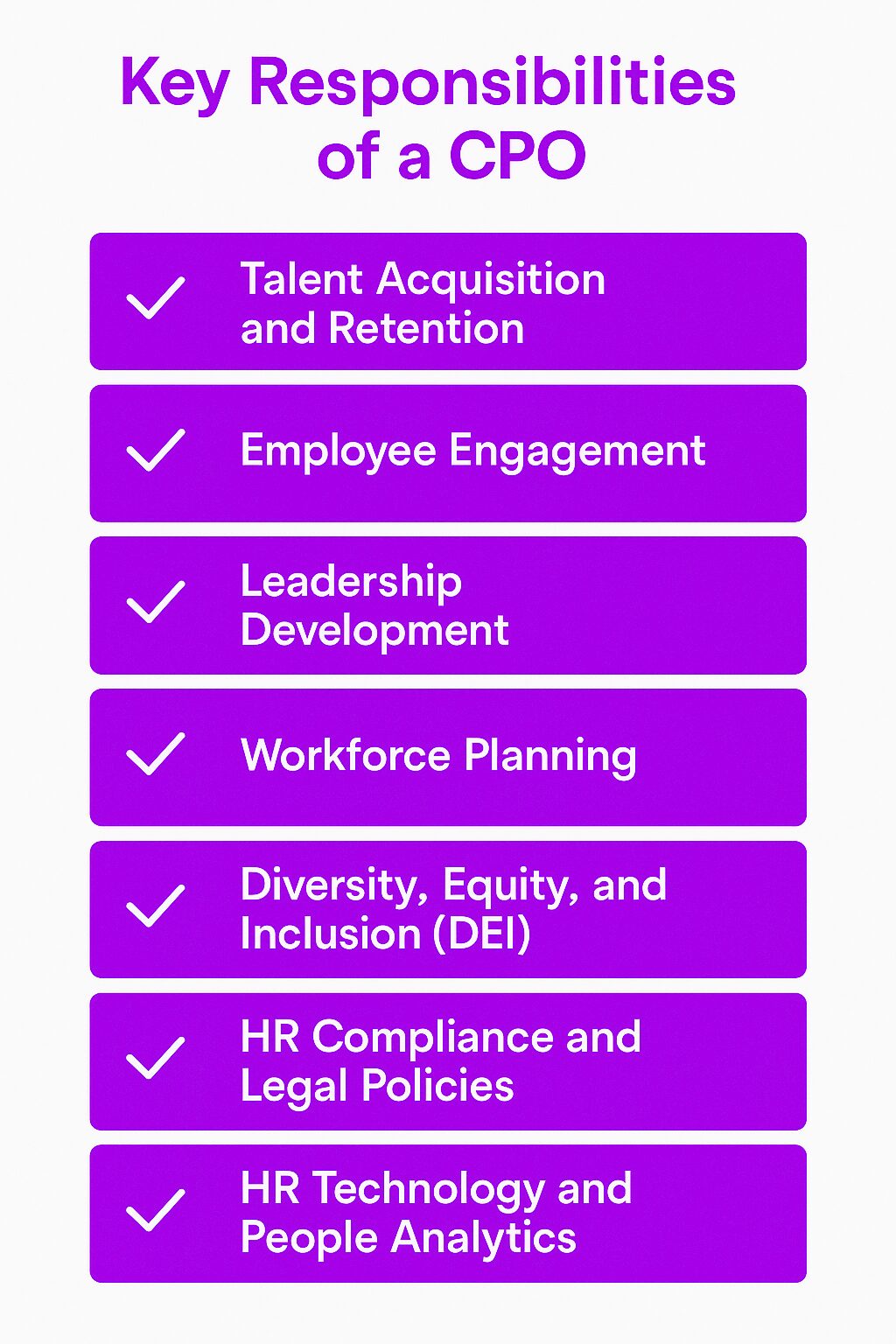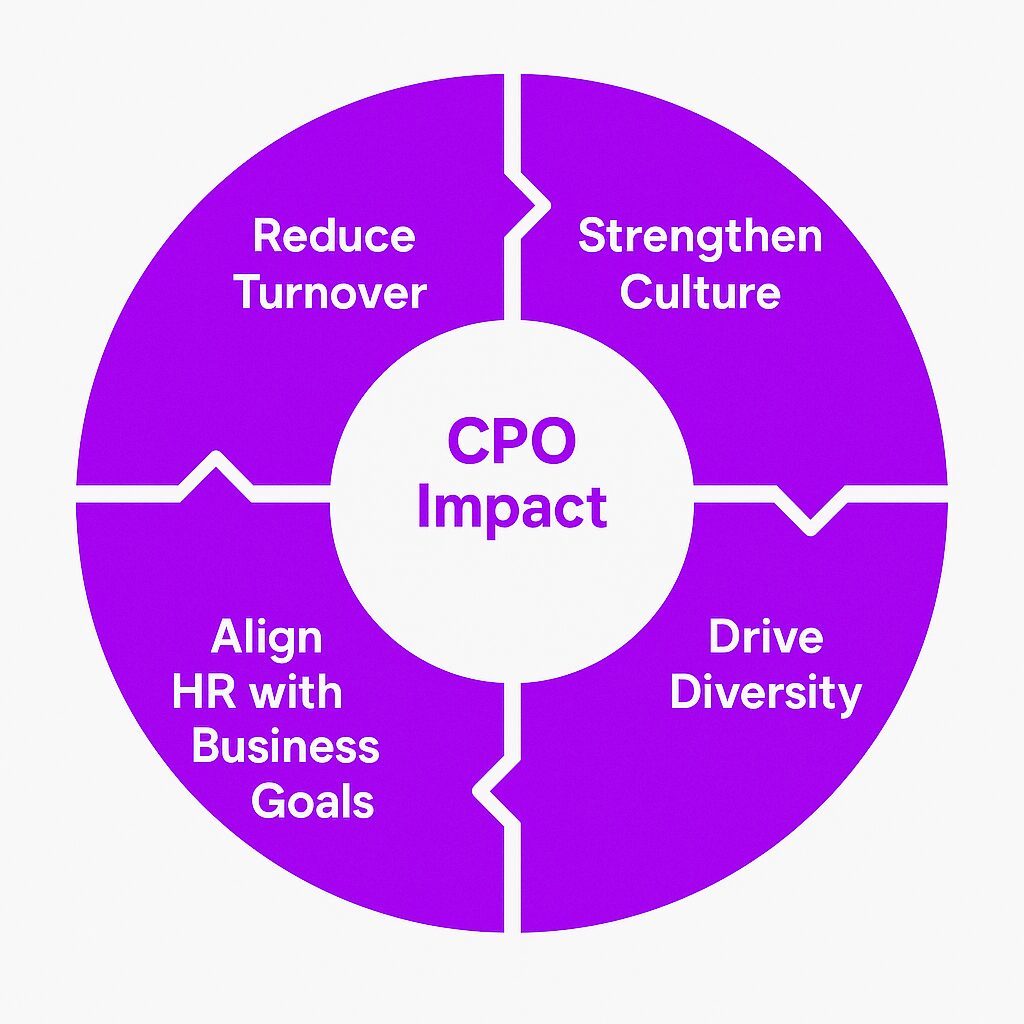What is a Chief People Officer?
A Chief People Officer (CPO) is a senior executive responsible for leading an organization’s human resources strategy. The role goes beyond traditional HR functions, focusing on company culture, employee experience, leadership development, and workforce planning. A CPO ensures that employees are engaged, productive, and aligned with business goals.
In contrast, the Chief Human Resources Officer (CHRO) traditionally emphasized HR policy, strategy, operations, and compliance. However, there has been a shift towards more people-centric approaches due to talent shortages and the need to bridge the gap between the workforce and executive management. This evolving expectation places the CHRO in a position where foundational HR management is integrated with long-term business success.
As businesses recognize employees as their most valuable asset, the CPO plays a critical role in shaping policies that attract, retain, and develop talent. The role is strategic, requiring collaboration with other executives to ensure people initiatives drive business growth.
The Role of a CPO
The CPO is responsible for all aspects of an organization’s people strategy. They oversee recruitment, performance management, professional development, compensation, and workplace culture. To effectively manage these functions, solid HR expertise is essential, as it enables the CPO to implement strategic HR practices that contribute to organizational growth and success. Their role is to ensure that HR policies align with broader business objectives and that employees thrive in their work environment. Additionally, HR leaders are now seen as key strategic figures who play a vital role in shaping organizational success by managing human capital.
Key Responsibilities

-
Talent Acquisition and Retention – Recruiting top talent and building retention strategies.
-
Employee Engagement – Creating a positive workplace culture and improving employee satisfaction.
-
Leadership Development – Implementing programs to identify and nurture future leaders.
-
Workforce Planning – Managing hiring needs, workforce diversity, and company-wide HR strategies.
-
Diversity, Equity, and Inclusion (DEI) – Promoting fair hiring practices and inclusive work environments.
-
HR Compliance and Legal Policies – Ensuring that the company adheres to labor laws and workplace regulations.
-
HR Technology and People Analytics – Leveraging digital tools to track workforce trends and improve decision-making.
-
Developing Training Programs – Creating tailored training initiatives to support leadership development and enhance employee retention.
Why Companies Need a CPO
A company’s success depends on the engagement and productivity of its workforce. A CPO plays a central role in ensuring that employees are satisfied, motivated, and aligned with business objectives. Effective management of human capital by the CPO is essential for driving business success, as they evaluate and implement strategies that enhance employee value and organizational culture. The role has gained prominence as organizations recognize the impact of people management on business performance.
How CPOs Contribute to Business Growth
-
Reducing turnover by creating employee development opportunities.
-
Strengthening workplace culture to boost morale and productivity.
-
Driving diversity and inclusion efforts to improve hiring and retention.
-
Aligning HR policies with corporate goals to enhance overall business success.
Challenges Faced by CPOs
While the CPO role is essential, it comes with its challenges. Future-focused chief executives understand that selecting the right CPO is crucial, as their work influences the entire organization and can significantly affect business opportunities.
Common Challenges
-
Balancing Business Goals and Employee Needs – Meeting workforce expectations while ensuring profitability.
-
Keeping Up with Compliance Regulations – Navigating evolving labor laws and workplace policies.
-
Managing Remote and Hybrid Workforces – Creating engagement strategies for employees in different work environments.
-
Driving Cultural Change – Overcoming resistance to new HR initiatives.
-
Measuring HR Impact – Demonstrating the return on investment (ROI) of people strategies.
How CPOs Overcome These Challenges
-
Using data-driven insights to measure employee satisfaction and workforce productivity.
-
Collaborating with other executives to align HR strategies with financial and operational goals.
-
Implementing employee feedback programs to refine policies and improve engagement.
-
Encouraging leadership training to ensure managers support workplace culture initiatives.
Skills and Qualifications
A Chief People Officer (CPO) requires a broad and varied set of skills to succeed in their role. Some of the key skills and qualifications include:
Business Acumen
A successful CPO must possess a deep understanding of the organization’s business goals and objectives. This includes the ability to analyze business trends and identify opportunities for growth. Knowledge of financial management and budgeting is crucial, as CPOs often need to align HR strategies with the company’s financial goals. Experience in strategic planning and execution is also essential, enabling CPOs to develop and implement effective people strategies that drive business success.
Communication and Interpersonal Skills
Excellent verbal and written communication skills are vital for a CPO, as they need to convey complex ideas clearly and persuasively. Building and maintaining relationships with stakeholders at all levels is a key part of the role, requiring strong interpersonal skills, including empathy and emotional intelligence. Experience in conflict resolution and negotiation is also important, as CPOs often need to mediate disputes and find mutually beneficial solutions.
The Key Components of People Strategy
Talent Acquisition, Talent Management, and Workforce Planning
Hiring the right people is crucial for business success. The CPO ensures that the company attracts and retains top talent. Workforce planning involves forecasting hiring needs, managing succession planning, and improving the overall employee experience. Chief people officers play a strategic role in talent acquisition and workforce planning, ensuring that the organization is well-equipped to meet its future needs.
Leadership and Employee Development
Investing in employee growth is critical for retention and productivity. CPOs lead training programs, mentorship initiatives, and leadership development efforts to ensure that employees have opportunities to grow within the company.
Compensation and Benefits
Competitive compensation and benefits help attract and retain employees. The CPO develops salary structures, incentive programs, and benefits packages that align with business needs and employee expectations. The chief people officer salary varies based on geographic location, industry, and company size, with additional benefits and bonuses often included; career growth paths for CPOs can lead to higher executive roles within the corporate hierarchy.
Diversity, Equity, and Inclusion (DEI) and Company Culture
A strong DEI strategy ensures a fair and inclusive workplace. CPOs lead initiatives that promote equitable hiring practices, fair compensation, and workplace diversity.
HR Technology and Digital Transformation
CPOs leverage HR technology to streamline hiring, performance management, and employee engagement. Data analytics and AI-driven insights help HR teams make informed decisions and improve workplace efficiency.
Career Development and Salary
The career path for a Chief People Officer typically involves a combination of education and extensive experience in human resources and related fields. Most CPOs start with a bachelor’s degree in Human Resources, Business Administration, or a related field. Several years of experience in HR or a related field, including talent management, employee engagement, and leadership development, are essential for advancing to senior roles. A master’s degree in Human Resources or Business Administration may be preferred for higher-level positions, and certification in HR, such as SHRM-CP or HRCI, can be beneficial.
The salary for a Chief People Officer can vary widely depending on factors such as location, industry, and experience. However, here are some general salary ranges:
-
Entry-level CPO: $80,000 – $120,000 per year
-
Mid-level CPO: $120,000 – $180,000 per year
-
Senior-level CPO: $180,000 – $250,000 per year
These figures reflect the significant responsibilities and expertise required for the role, as well as the impact a CPO can have on an organization’s success.
Best Practices for CPOs
-
Develop a Strong Company Culture – Foster an environment where employees feel valued and supported.
-
Leverage People Analytics – Use data to drive HR decisions and measure engagement.
-
Prioritize Employee Well-Being – Implement policies that support work-life balance and mental health.
-
Encourage Transparent Communication – Promote open discussions between leadership and employees.
-
Support Leadership Development – Provide managers with the tools they need to lead effectively.
How to Succeed as a Chief People Officer
To succeed as a Chief People Officer, it’s essential to develop a deep understanding of the organization’s business goals and objectives. Building strong relationships with stakeholders at all levels is crucial, as is staying up-to-date with the latest trends and best practices in HR and talent management. Fostering a culture of innovation and continuous learning can help drive organizational growth and employee satisfaction.
Developing and implementing effective talent management strategies is a key part of the role. This includes creating leadership development programs, shaping company culture, and ensuring that HR initiatives align with business objectives. Measuring and evaluating the impact of these initiatives on business outcomes is also important, as it helps demonstrate the value of the HR function and supports continuous improvement.
By following these tips and developing the necessary skills and qualifications, a Chief People Officer can play a critical role in driving business success and achieving organizational goals.
The Future of the CPO Role
The role of the CPO is expected to grow in importance as workplaces continue to evolve. Effective human resource management is critical in today’s digital age, highlighting the need for experienced personnel to oversee this function. Future trends include:
-
Greater focus on employee well-being and mental health.
-
Increased use of AI and automation in HR decision-making.
-
Stronger emphasis on diversity and inclusion initiatives.
-
More strategic involvement in business planning and digital transformation.
Real-World Examples
-
Google: Implements workplace policies that prioritize employee satisfaction and leadership development.
-
Salesforce: Invests in diversity and inclusion initiatives to create a more equitable workplace.
-
Microsoft: Uses data-driven HR strategies to optimize workforce planning and employee retention.
Conclusion
The Chief People Officer is responsible for shaping an organization’s workforce strategy. Their focus on culture, leadership, and employee engagement drives long-term business success. Companies that prioritize strong people management will see higher retention, improved performance, and stronger company growth.







